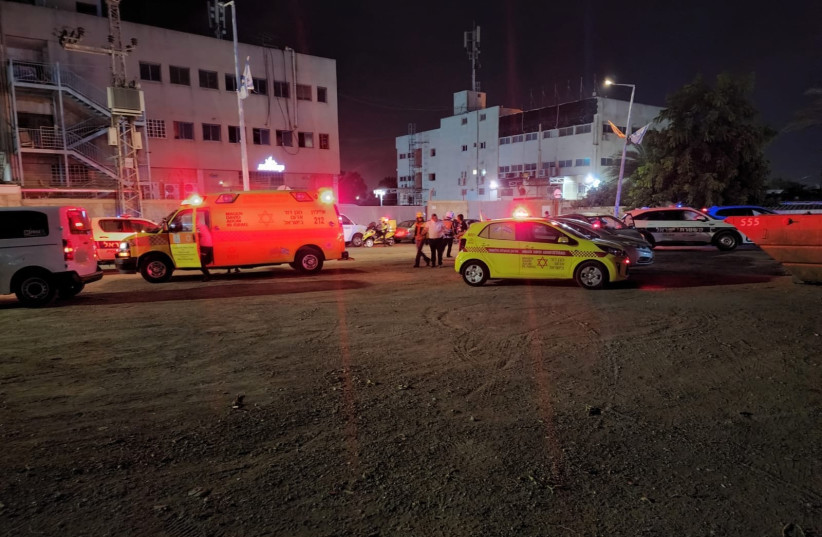Violence is once again surging throughout the Israeli-Arab sector. After a year during which the outgoing government claimed that it had made great strides in combating crime, the situation only seems to be deteriorating.
It’s not just the fringes of society and those engaging in underworld activity either. Manar Hajjaj, 34, and one of her twin daughters, 14-year-old Hadra, were murdered in their car in Lod on Monday night in the latest crime-related killings in the Arab sector.
They were killed under the residential building where they lived after returning from shopping at the supermarket. The girl’s twin sister, Miriam, was taken to Shamir Medical Center in moderate condition and has reportedly not yet returned home out of fear that whoever killed her mother and sister will still try to kill her.
The double homicide came just a day after Nidal Aghbariya, an Arab journalist who ran the Bldtna news site, was shot dead in his car in Umm el-Fahm on Sunday.
After the shooting, a video showed journalist Hassan Shalan shouting at the police: “You should be ashamed of yourselves, because you do not want to work. You come to the crime scene and take pictures without doing anything.”

Number of murdered Israeli Arabs continues to rise
The number of Israeli Arabs who have lost their lives during 2022 is nearing 80, according to the NGO Abraham Initiatives. Based on events of the last week, it will sadly only continue to climb.
There is little doubt that most Arabs deplore this sense of anarchy where you don’t know if you’ll return home safely. As Khaled Abu Toameh reported last week, there is a feeling on the Arab street that the police are not doing enough.
“The Arabs are paying the price for the negligence of the police and other law-enforcement agencies. Why is it that when a Jew is killed, the perpetrators are almost always captured, but when the victim is an Arab, most of the homicides are not solved?” one resident of Lod asked Abu Toameh.
“The Arabs are paying the price for the negligence of the police and other law-enforcement agencies. Why is it that when a Jew is killed, the perpetrators are almost always captured, but when the victim is an Arab, most of the homicides are not solved?”
Lod resident
There are a number of tracks that Israel needs to invest in to better fight Arab crime. First, it needs to continue the campaign it has undertaken to round up illegal weapons and increase the police presence in Arab towns and cities.
Second, it needs to break up Arab criminal gangs and syndicates, and third, it needs to invest in education and municipal reforms.
The last government recognized this and worked together with Ra’am and its leader Mansour Abbas to up investments in the Arab sector on multiple fronts – education, infrastructure, medical facilities and the creation of more jobs. The collapse of that government coalition and the changing tone of political rhetoric does not help the situation.
Today, instead of thinking about ways to combat crime, our politicians are too busy arguing over whether it is legitimate for an Arab party to sit in the coalition. The Likud, for example, has actively demonized Ra’am and Abbas as supporters of terrorism. Does that create motivation to want to try and change the reality?
“The situation is very dangerous,” social worker Sana’ Ibrahim, a resident of Kafr Kassem in the Triangle area, told The Jerusalem Post last week. “There’s a feeling that the gangs control our cities and villages. They have many weapons and are no longer afraid of the police. Many people are afraid to leave their homes at night because of the gangsters.”
Ultimately, we should not fool ourselves into thinking that violence in Arab society is their own problem that they need to solve. All of Israel and all Israelis suffer when there is rampant crime and murder on Arab streets. For this to stop, we need a national plan that includes investment in more police, judicial reforms and education.
This needs to transcend politics and rise above the petty political fights between the Likud, Yesh Atid and other parties.
With two million Arab citizens in Israel, it is in everyone’s interest that they feel integrated, safe and secure on their streets and believe that they have prospects for a peaceful and prosperous life.
That is currently not the case and it needs to change.
Instead of arguing about petty issues like “Yes Netanyahu or No Netanyahu,” Israel’s parties and candidates should be grappling with the challenges that will truly determine the future of the State of Israel.
